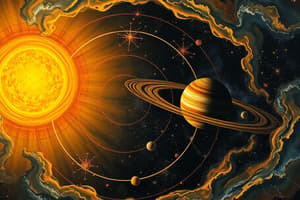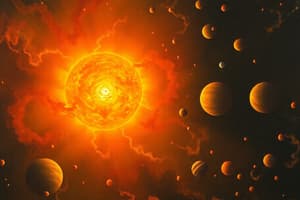Podcast
Questions and Answers
Which condition defines an object as a planet according to the IAU definition of 2006?
Which condition defines an object as a planet according to the IAU definition of 2006?
- It orbits the Sun, is spherical, and has a moon
- It orbits the Sun, is spherical, and has cleared its orbit of other objects (correct)
- It orbits the Sun, is spherical, and has rings
- It orbits the Sun, is large, and has cleared its orbit of other objects
Which of the following is a dwarf planet according to the text?
Which of the following is a dwarf planet according to the text?
- Mars
- Saturn
- Ceres (correct)
- Jupiter
What type of planets are Jupiter, Saturn, Uranus, and Neptune classified as in the Solar System?
What type of planets are Jupiter, Saturn, Uranus, and Neptune classified as in the Solar System?
- Dwarf planets
- Terrestrial planets
- Gas planets
- Giant planets (correct)
What do we observe the planets as following from Earth?
What do we observe the planets as following from Earth?
What is the term for large planetesimals (~ 400–800 km) becoming warm internally?
What is the term for large planetesimals (~ 400–800 km) becoming warm internally?
Which galaxy is our Solar System part of?
Which galaxy is our Solar System part of?
What are the four planets closest to the Sun referred to as?
What are the four planets closest to the Sun referred to as?
What does the Condensation theory address?
What does the Condensation theory address?
In what year did the IAU officially define what a planet in our Solar System is?
In what year did the IAU officially define what a planet in our Solar System is?
What is the characteristic of most planets in the Solar System regarding their orbital planes?
What is the characteristic of most planets in the Solar System regarding their orbital planes?
What process generates heat internally in large planetesimals?
What process generates heat internally in large planetesimals?
What is the term for the four planets closest to the Sun?
What is the term for the four planets closest to the Sun?
What contributes to the formation of planets according to the text?
What contributes to the formation of planets according to the text?
What is the frost line mentioned in the text?
What is the frost line mentioned in the text?
What does the condensation theory explain?
What does the condensation theory explain?
What will the OSIRIS-REx mission return to Earth with according to the text?
What will the OSIRIS-REx mission return to Earth with according to the text?
What leads to the formation of a metallic core and rocky mantle in planetesimals?
What leads to the formation of a metallic core and rocky mantle in planetesimals?
What characteristic differentiates the first generation stars mentioned in the text?
What characteristic differentiates the first generation stars mentioned in the text?
What is the significance of the 7° orbit of Mercury mentioned in the text?
What is the significance of the 7° orbit of Mercury mentioned in the text?
What is the role of planetesimals in the formation of planets according to the text?
What is the role of planetesimals in the formation of planets according to the text?
What is the common characteristic of small planetesimals according to the text?
What is the common characteristic of small planetesimals according to the text?
What is the primary factor contributing to the formation of sun-like stars according to the text?
What is the primary factor contributing to the formation of sun-like stars according to the text?
What characterizes the planetary orbits mentioned in the text?
What characterizes the planetary orbits mentioned in the text?
What led to the formation of the sun and the protoplanetary disk according to the text?
What led to the formation of the sun and the protoplanetary disk according to the text?
What primarily causes a compass to point north?
What primarily causes a compass to point north?
What is the region protected by the Earth's magnetic field called?
What is the region protected by the Earth's magnetic field called?
What is the primary component of Earth's atmosphere?
What is the primary component of Earth's atmosphere?
What primarily creates air pressure on the surroundings?
What primarily creates air pressure on the surroundings?
What is the most common gas found in the Earth’s atmosphere?
What is the most common gas found in the Earth’s atmosphere?
What protects us from electrically charged particles of the solar wind?
What protects us from electrically charged particles of the solar wind?
Which is the thinnest layer of the Earth?
Which is the thinnest layer of the Earth?
Which layer of the Earth is the hottest?
Which layer of the Earth is the hottest?
What are the two most common gases found in the Earth’s atmosphere?
What are the two most common gases found in the Earth’s atmosphere?
What are the primary components of the Earth’s solid mass?
What are the primary components of the Earth’s solid mass?
What is the average depth of the sea floor?
What is the average depth of the sea floor?
What is the average elevation of the land?
What is the average elevation of the land?
What are the solid, naturally occurring substances with a crystalline structure called?
What are the solid, naturally occurring substances with a crystalline structure called?
What is the boundary between the Earth's crust and mantle called?
What is the boundary between the Earth's crust and mantle called?
What gives a more detailed picture of the Earth's interior?
What gives a more detailed picture of the Earth's interior?
What is the solid portion of the Earth's interior that extends from the Moho to a depth of 660 km called?
What is the solid portion of the Earth's interior that extends from the Moho to a depth of 660 km called?
What is the most abundant gas in the Earth's atmosphere?
What is the most abundant gas in the Earth's atmosphere?
Which layer of the Earth's interior is solid and composed of a mixture of iron and nickel?
Which layer of the Earth's interior is solid and composed of a mixture of iron and nickel?
What is the average depth of the sea floor variation known as?
What is the average depth of the sea floor variation known as?
Which category of material is characterized by the solidification of molten material?
Which category of material is characterized by the solidification of molten material?
What is the primary component of the Earth's solid mass?
What is the primary component of the Earth's solid mass?
Which layer of the Earth's interior is characterized by plastic flow and can flow at less than 15 cm per year?
Which layer of the Earth's interior is characterized by plastic flow and can flow at less than 15 cm per year?
What type of rock is formed through the cementing together of solid material?
What type of rock is formed through the cementing together of solid material?
What is the boundary between the Earth's crust and mantle known as?
What is the boundary between the Earth's crust and mantle known as?
What is the primary role of the magnetosphere?
What is the primary role of the magnetosphere?
What is the primary component of the Earth's atmosphere aside from nitrogen?
What is the primary component of the Earth's atmosphere aside from nitrogen?
What is the primary category of material characterized by the accumulation of loose grains?
What is the primary category of material characterized by the accumulation of loose grains?
What is the primary category of material characterized by a solid with no orderly arrangement of atoms?
What is the primary category of material characterized by a solid with no orderly arrangement of atoms?
Flashcards
Planet Definition
Planet Definition
Orbits the Sun, is spherical, and has cleared its orbit.
Dwarf Planet
Dwarf Planet
Ceres is classified as this.
Giant Planets
Giant Planets
Jupiter, Saturn, Uranus, and Neptune are called this.
Ecliptic
Ecliptic
Signup and view all the flashcards
Radiogenic Heating
Radiogenic Heating
Signup and view all the flashcards
Milky Way
Milky Way
Signup and view all the flashcards
Terrestrial Planets
Terrestrial Planets
Signup and view all the flashcards
Condensation Theory
Condensation Theory
Signup and view all the flashcards
Planet Definition Year
Planet Definition Year
Signup and view all the flashcards
Ecliptic Plane
Ecliptic Plane
Signup and view all the flashcards
Planets Formation
Planets Formation
Signup and view all the flashcards
Frost Line
Frost Line
Signup and view all the flashcards
Condensation Theory
Condensation Theory
Signup and view all the flashcards
OSIRIS-REx
OSIRIS-REx
Signup and view all the flashcards
Internal Differentiation
Internal Differentiation
Signup and view all the flashcards
First Generation Stars
First Generation Stars
Signup and view all the flashcards
Protoplanets
Protoplanets
Signup and view all the flashcards
Small Planetesimals
Small Planetesimals
Signup and view all the flashcards
Sun-like Star Formation
Sun-like Star Formation
Signup and view all the flashcards
Planetary Orbits
Planetary Orbits
Signup and view all the flashcards
Sun and Disk Formation
Sun and Disk Formation
Signup and view all the flashcards
Compass Direction
Compass Direction
Signup and view all the flashcards
Magnetosphere
Magnetosphere
Signup and view all the flashcards
Earth's Atmopshere
Earth's Atmopshere
Signup and view all the flashcards
Air Pressure
Air Pressure
Signup and view all the flashcards
Most Common Gas
Most Common Gas
Signup and view all the flashcards
Solar Wind Protection
Solar Wind Protection
Signup and view all the flashcards
Oceanic Crust
Oceanic Crust
Signup and view all the flashcards
Earths core
Earths core
Signup and view all the flashcards
Study Notes
Formation of the Solar System and Planets
- Planetary orbits show prograde motion, with most orbital planes lying within 3o of Earth's orbit
- Mercury's orbit is 7o, greater than the Moon's 5o
- Planets exhibit a range of tilts in their axis of rotation
- First generation stars were massive and short-lived, leading to the formation of sun-like stars
- Ice and dust in the protostellar disk contribute to the formation of planets
- Accretion disk within a nebula in the Milky Way formed the sun and the protoplanetary disk
- The frost line divided the terrestrial and Jovian planets
- Planetesimals formed from specks of dust, eventually leading to the formation of protoplanets
- Condensation theory explains the formation of planets on the same plane from the protoplanetary disk
- The OSIRIS-REx mission will return to Earth with material from asteroid Bennu
- Internal differentiation of planetesimals leads to the formation of a metallic core and rocky mantle
- Small planetesimals are cool and rigid, leading to irregular shapes; the Earth became round due to internal melting and iron accumulation
Studying That Suits You
Use AI to generate personalized quizzes and flashcards to suit your learning preferences.




